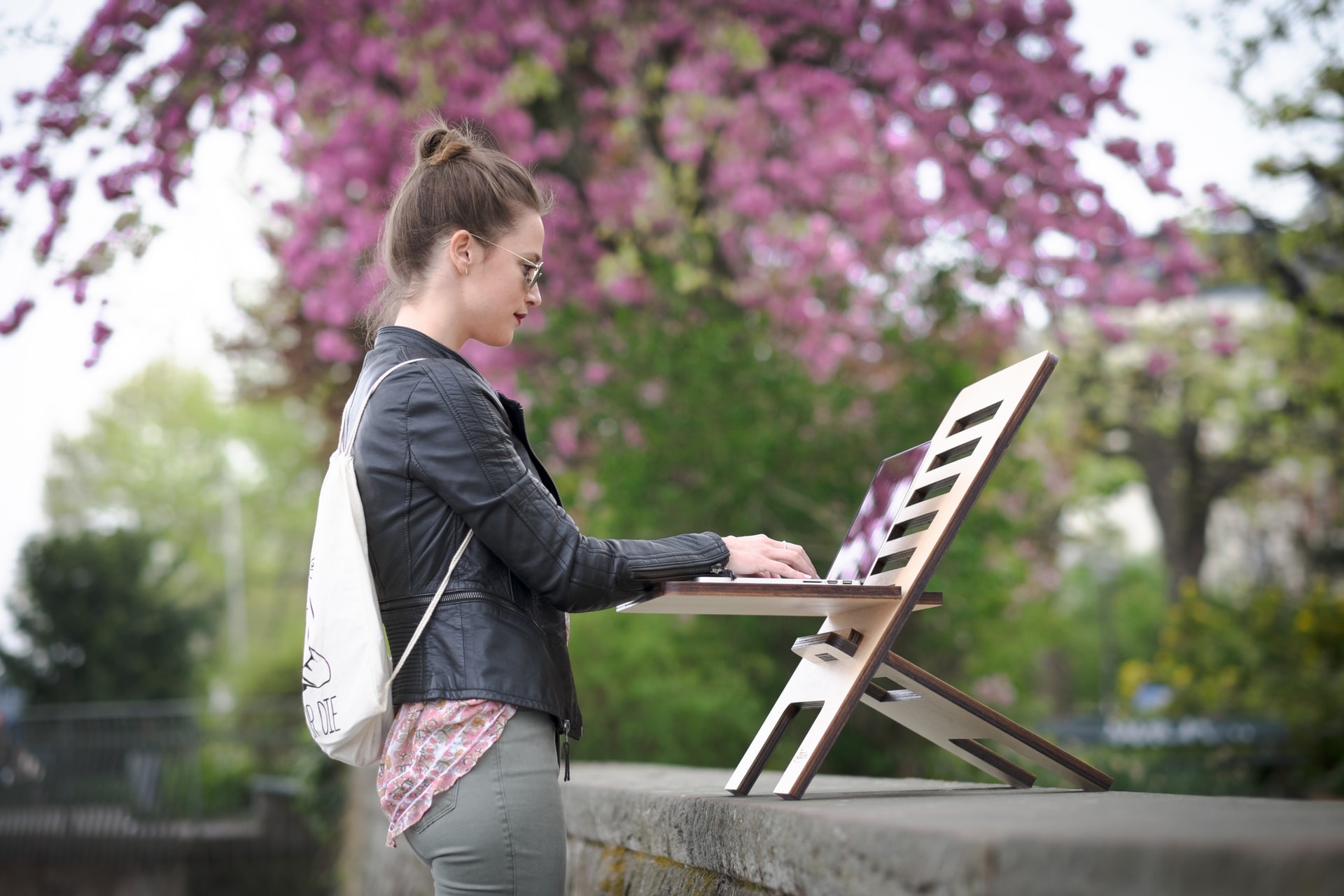Ever asked someone how to be more productive at home? It’s like asking for weight loss tips. Everyone has an answer and a story. Since 2020, we’ve all become experts.
So how do you know what is actually useful and what is just fluff?
The benefits of remote work have been wonderful, but it ain’t all sweatpants and ice cream for breakfast. Sitting alone in your house all day can be deafening. As can sharing a small space with children, grandparents, and pets.
If you want to know how to be productive at home, there are two kinds of lists. One includes hacks for how to squeeze a few more minutes out of the day, like answering emails on the toilet. Err, no thanks.
The second is how to be productive at home, sustainably. Like, as long as you want. Like, this is working out pretty well and I don’t want to go back to the office anytime soon. Like, you might want to make this part of your life till you retire.
This is the second type.
60+ tips for how to be productive at home
Energy management
One of the key parts of working well from home is managing your energy as opposed to your time.
1. Pay attention to your high and low times. When do you naturally have a lot of energy? When do you naturally have a dip? Take a week and keep a notepad near and assess your energy levels every hour or so.
2. Identify your most productive time of the day. This is the sweet spot when you do your best work. 6am? 10am-noon? 10pm? Try out a few different options and see when you can usually get into the groove easiest.
3. Schedule your focus time when your natural energy is highest. Your focus mode of work is when you block out all distractions and get down to business. Block this time on your calendar everyday and protect it diligently.
4. Don’t push through an energy slump. When you notice you mind starting to slag, or you can’t type as fast, or you start to get more irritated, just stop. Take a nap, take a walk, do something away from the screen. Usually, a 20 minute break is all you need to refocus.
5. Stop measuring productivity in hours. The day is about doing good work, not working for a certain number of hours. Get your important stuff done and don’t feel bad about ending early.
6. Shake things up. Don Draper caught a matinee to clear his head sometimes. Maybe you need to take a run, or meet someone fun for lunch. Breaking up the routine every once in a while can help your overall productivity.
7. Relentlessly prioritize. Always rank your tasks and do the most important things first. Doing low-impact but easy work is a quick way to get depressed while trying to be productive at home.
8. Try the pomodoro technique. If a task doesn’t have a natural ending point, set a timer for somewhere between 20 and 40 minutes and work diligently until it goes off.
9. Plan your meetings. For many, meetings are the most draining thing for your energy. Others generate energy from meetings. Either way, they take a lot to prepare for. Consider clubbing multiple meetings back to back so that you can get them all done at once. But it’s also nice to have time to prepare before and debrief after a meeting. Find the routine that works for you.
10. Use your calendar. The calendar is one of the most powerful tools you have in a digital workplace. Use timeboxing to make sure you can fit in everything you want to do. Block out time for focus work, and don’t allow people to schedule over existing meetings without your permission.
11. Consider breaking up your day. You might do well working straight for 5-6 hours. Or, you might do better putting in 2 hours early in the morning, 2 hours around lunch, another hour in the afternoon, and then one more hour in the evening.
12. Try a 4 day workweek. Imagine how much more productive you’d be if you had to slash a day off work. You’d be much more focused, and could reserve that extra day for all your errands and online shopping that you sprinkle throughout your week. Listen to Rodney Evans’ podcast on her experience.
13. Schedule random coffee times with virtual coworkers. One of the ways we recharged energy at the workplace was connecting with other humans. This helps you decompress, clear the cache, and forces you to talk about what you are doing, which might help you gain a new perspective.
Healthy habits
14. Keep your work phone out of where you sleep. Never check work messages as soon as the alarm goes off. Find a better way to start the day and keep work at bay.
15. Have a morning routine. Find things you love that give you joy to start the day. It might be exercise, mediation, reading, yoga, or making all your meals for the day.
16. Get dressed. Nothing formal. Just wear something different than you went to bed in. Something that makes you feel like you are active and alive.
17. Have a clear start to the work day. Give the kids a kiss, grab the paper, your coffee, or whatever else you need. Don’t slide into work, but walk confidently. The goal is to make a clear distinction between when you are on and off.
18. Coordinate times with your housemates. Make sure the people around you know when your usual work times. If you live with parents, they may not fully understand the unique nature of how to be productive at home, but explaining your hours will help. Similarly, kids should know when they aren’t allowed to bug you. Work out schedules with roommates and spouses.
19. Use stimulants wisely. Coffee, tea, and other stimulants can be effective to help you focus, but think about when you really need them. Is it better to start the day off, or to have a pick-me-up later on? Aim for no more than two cups a day.
20. Plan your food breaks. For your body’s sake, trying to keep to the same time every day. This also prevents you from sneaking in that second breakfast just because a meeting was overly stressful.
21. Find your anti-snack. Snacks can be nice, but they can also be a crutch for focus. When tempted to go and “just get something small”, find something else you can fall back on such as a pack of gum you keep in your desk.
22. Take screen breaks throughout the day. Keep a physical book near you that you can read for 15 minutes to give your eyes a break. Or take a quick walk up and down the street.
23. Try a walking meeting. If your meeting is a discussion that doesn’t require a lot of visuals, take a walk while you talk and connect over your phone. You’ll still be productive, but won’t be as drained after the meeting.
24. Have an end-of-work ritual. Do something that signals to your body and others that you are done with work. Play some music, take a walk, read a book, do a puzzle, or go for a run.
25. Use separate devices for work, and leave them in your office setting. Don’t log into your work credentials on your personal devices like phones or tablets.
26. If you have to use the same phone all the time, uninstall work apps from your phone every Friday, and reinstall them on Monday.
Get your workspace in shape
27. Have a designated place to do work. Not your bed. If you want to be productive at home, you need some location that consistently works for you and won’t be constantly interrupted by others.
28. Consider an alternative space. Being in the same place all day can be boring. You might want to have video calls in one spot, your email chair, and then another place for focus work.
29. Upgrade your internet. Go for the plan where you never have to think about your service.
30. Get a standing desk. Sitting all day is rough on the body. You can get a convertible top fairly cheaply to give yourself the option to stand now and again.
31. Use external monitors. A 13 inch laptop screen is pretty small to stare at all day. Get something external and put it at eye level so you don’t strain your neck. Consider going with double monitors if you often have lots of applications running.
32. Get a wireless mouse. Trackpads on laptops are not something you want to use for the rest of your career.
33. Get a better keyboard. The keyboards on laptops were built to be used when traveling. If you do a lot of typing, consider something that is going to give you more functionality and be more comfortable.
34. Upgrade your camera. Most webcams on laptops are pretty poor quality. Seeing a sharp image of yourself on the screen is very gratifying and keeps you motivated.
35. Get a nice chair. You and that chair are going to be real close. Find one that fits you and stick with it.
36. Improve your lighting. Consider a ring light, or get some nice floor lamps. Again, looking great on video calls does wonders for your self-esteem.
37. Upgrade your microphone. This one is only really relevant if you are doing some semi-professional recording, but if you’ve got some budget left over, having a nice external microphone helps to improve your setup.
38. Get some nice headphones/earpods. It’s hard to be productive at home if you’ve got a lot of other people making noise. Find something you can wear comfortably throughout the day that also has a nice microphone with it.
39. Find music that helps you focus. If you need to block out other sounds, or if you don’t like the silence, turn to music. Try to find something that works consistently without having to skip or mess with songs every 3-5 minutes.
40. Clean your space often. While some people thrive off a messy workspace, you can still stand to keep it clear of mugs and meaningless paper.
41. Prep your space the night before. Before you go to bed, check to make sure everything is ready for you. Your morning self will thank you.
Minimizing distractions
42. Rather than get frustrated at yourself for being distracted, be curious. Keep a list of the things that distract you so that you can make plans to deal with them.
43. Dr. Gloria Mark taught us that distractions can be external or internal. External means someone else caused them. Internal means your own mind distracted you. Look over your list and categorize them as one or the other.
44. You can also categorize distractions as either digital (phone notifications) or physical (the urge to go get a snack all the time).
45. Internal digital distractions are things like going to Google to answer a random question in your head, or wondering what’s happening on Facebook or Twitter or email. You can use browser plugins to limit your use of these pages, and prevent scroll doom during your work time.
46. Limit the number of tabs you can keep up at any time. The visual cues at the top of the browser are a constant distraction of all the other things you might do.
47. Find a way to handle the internal urge to submit to distractions such as the pomodoro technique (“I’ll check my email after the timer goes off”), time boxing, and your calendar.
48. Use a task management system so that if you suddenly remember you need to do something, you can write it down quickly and get back to what you were doing.
49. Go to the bathroom before you start a long stretch of productive work.
50. Give yourself periods of physical activity as natural breaks during the day so that you’ll be less antsy when you are trying to work.
51. Meditation is a powerful practice to help you recenter your mind and not give into your thoughts. Learn how to take control and allow distractive thoughts and impulses to pass.
52. Turn all your notifications off. Instead, create transition times when you will check email and messaging apps to see what you missed. Seek out notifications when it’s convenient for you, not the instant it happens.
53. Keep your phone out of arm’s reach during the day.
54. Don’t take your phone to the bathroom. It will be ok. You will survive.
55. Make sure housemates know when you are open to being bothered and when you are not. If you need to, put up a sign to let people know when you are in focus mode.
Other ideas
56. Work from a new location on occasion. A new location can help you to focus more, see a problem from a new angle, or give you more data on how you want to improve your workspace.
57. Join video meetings early. This can give you some extra time to connect with coworkers, and also saves you the embarrassment of forgetting the meeting or showing up late.
58. Don’t rely on work for social interactions. Work is what you do to get paid. If you sense you are feeling lonely, make regular time to connect with friends, or join a club, meetup, religious community, sport, or something else.
59. Talk about productivity with your kids. No one else is going to teach them how to take charge of their own time. Share your struggles, what works, and allow them to remind you that it’s not always about clocking the hours, but also enjoying life.
60. Distribute the chores. Working next to a sink full of dirty dishes or a full laundry basket is a permanent stressor. Make sure everyone in the house pulls their weight to get things done. Since you are spending more time together in the house, it’s worth it to pull together.
61. Hire a cleaner. Or, if your budget allows it, pay someone a fair wage to come in and clean your workspace for you now and again. If you are going to be in your house all day long, having some extra help can take a lot of pressure off.
62. Go easy on yourself. This is a new era of work, and no one has prepared you for it. It will take time to figure out, but you can always improve and find new ways for how to be productive at home.
Photo by Jimmy Dean on Unsplash
Ever asked someone how to be more productive at home? It’s like asking for weight loss tips. Everyone has an answer and a story. Since 2020, we’ve all become experts.
So how do you know what is actually useful and what is just fluff?
The benefits of remote work have been wonderful, but it ain’t all sweatpants and ice cream for breakfast. Sitting alone in your house all day can be deafening. As can sharing a small space with children, grandparents, and pets.
If you want to know how to be productive at home, there are two kinds of lists. One includes hacks for how to squeeze a few more minutes out of the day, like answering emails on the toilet. Err, no thanks.
The second is how to be productive at home, sustainably. Like, as long as you want. Like, this is working out pretty well and I don’t want to go back to the office anytime soon. Like, you might want to make this part of your life till you retire.
This is the second type.
60+ tips for how to be productive at home
Energy management
One of the key parts of working well from home is managing your energy as opposed to your time.
1. Pay attention to your high and low times. When do you naturally have a lot of energy? When do you naturally have a dip? Take a week and keep a notepad near and assess your energy levels every hour or so.
2. Identify your most productive time of the day. This is the sweet spot when you do your best work. 6am? 10am-noon? 10pm? Try out a few different options and see when you can usually get into the groove easiest.
3. Schedule your focus time when your natural energy is highest. Your focus mode of work is when you block out all distractions and get down to business. Block this time on your calendar everyday and protect it diligently.
4. Don’t push through an energy slump. When you notice you mind starting to slag, or you can’t type as fast, or you start to get more irritated, just stop. Take a nap, take a walk, do something away from the screen. Usually, a 20 minute break is all you need to refocus.
5. Stop measuring productivity in hours. The day is about doing good work, not working for a certain number of hours. Get your important stuff done and don’t feel bad about ending early.
6. Shake things up. Don Draper caught a matinee to clear his head sometimes. Maybe you need to take a run, or meet someone fun for lunch. Breaking up the routine every once in a while can help your overall productivity.
7. Relentlessly prioritize. Always rank your tasks and do the most important things first. Doing low-impact but easy work is a quick way to get depressed while trying to be productive at home.
8. Try the pomodoro technique. If a task doesn’t have a natural ending point, set a timer for somewhere between 20 and 40 minutes and work diligently until it goes off.
9. Plan your meetings. For many, meetings are the most draining thing for your energy. Others generate energy from meetings. Either way, they take a lot to prepare for. Consider clubbing multiple meetings back to back so that you can get them all done at once. But it’s also nice to have time to prepare before and debrief after a meeting. Find the routine that works for you.
10. Use your calendar. The calendar is one of the most powerful tools you have in a digital workplace. Use timeboxing to make sure you can fit in everything you want to do. Block out time for focus work, and don’t allow people to schedule over existing meetings without your permission.
11. Consider breaking up your day. You might do well working straight for 5-6 hours. Or, you might do better putting in 2 hours early in the morning, 2 hours around lunch, another hour in the afternoon, and then one more hour in the evening.
12. Try a 4 day workweek. Imagine how much more productive you’d be if you had to slash a day off work. You’d be much more focused, and could reserve that extra day for all your errands and online shopping that you sprinkle throughout your week. Listen to Rodney Evans’ podcast on her experience.
13. Schedule random coffee times with virtual coworkers. One of the ways we recharged energy at the workplace was connecting with other humans. This helps you decompress, clear the cache, and forces you to talk about what you are doing, which might help you gain a new perspective.
Healthy habits
14. Keep your work phone out of where you sleep. Never check work messages as soon as the alarm goes off. Find a better way to start the day and keep work at bay.
15. Have a morning routine. Find things you love that give you joy to start the day. It might be exercise, mediation, reading, yoga, or making all your meals for the day.
16. Get dressed. Nothing formal. Just wear something different than you went to bed in. Something that makes you feel like you are active and alive.
17. Have a clear start to the work day. Give the kids a kiss, grab the paper, your coffee, or whatever else you need. Don’t slide into work, but walk confidently. The goal is to make a clear distinction between when you are on and off.
18. Coordinate times with your housemates. Make sure the people around you know when your usual work times. If you live with parents, they may not fully understand the unique nature of how to be productive at home, but explaining your hours will help. Similarly, kids should know when they aren’t allowed to bug you. Work out schedules with roommates and spouses.
19. Use stimulants wisely. Coffee, tea, and other stimulants can be effective to help you focus, but think about when you really need them. Is it better to start the day off, or to have a pick-me-up later on? Aim for no more than two cups a day.
20. Plan your food breaks. For your body’s sake, trying to keep to the same time every day. This also prevents you from sneaking in that second breakfast just because a meeting was overly stressful.
21. Find your anti-snack. Snacks can be nice, but they can also be a crutch for focus. When tempted to go and “just get something small”, find something else you can fall back on such as a pack of gum you keep in your desk.
22. Take screen breaks throughout the day. Keep a physical book near you that you can read for 15 minutes to give your eyes a break. Or take a quick walk up and down the street.
23. Try a walking meeting. If your meeting is a discussion that doesn’t require a lot of visuals, take a walk while you talk and connect over your phone. You’ll still be productive, but won’t be as drained after the meeting.
24. Have an end-of-work ritual. Do something that signals to your body and others that you are done with work. Play some music, take a walk, read a book, do a puzzle, or go for a run.
25. Use separate devices for work, and leave them in your office setting. Don’t log into your work credentials on your personal devices like phones or tablets.
26. If you have to use the same phone all the time, uninstall work apps from your phone every Friday, and reinstall them on Monday.
Get your workspace in shape
27. Have a designated place to do work. Not your bed. If you want to be productive at home, you need some location that consistently works for you and won’t be constantly interrupted by others.
28. Consider an alternative space. Being in the same place all day can be boring. You might want to have video calls in one spot, your email chair, and then another place for focus work.
29. Upgrade your internet. Go for the plan where you never have to think about your service.
30. Get a standing desk. Sitting all day is rough on the body. You can get a convertible top fairly cheaply to give yourself the option to stand now and again.
31. Use external monitors. A 13 inch laptop screen is pretty small to stare at all day. Get something external and put it at eye level so you don’t strain your neck. Consider going with double monitors if you often have lots of applications running.
32. Get a wireless mouse. Trackpads on laptops are not something you want to use for the rest of your career.
33. Get a better keyboard. The keyboards on laptops were built to be used when traveling. If you do a lot of typing, consider something that is going to give you more functionality and be more comfortable.
34. Upgrade your camera. Most webcams on laptops are pretty poor quality. Seeing a sharp image of yourself on the screen is very gratifying and keeps you motivated.
35. Get a nice chair. You and that chair are going to be real close. Find one that fits you and stick with it.
36. Improve your lighting. Consider a ring light, or get some nice floor lamps. Again, looking great on video calls does wonders for your self-esteem.
37. Upgrade your microphone. This one is only really relevant if you are doing some semi-professional recording, but if you’ve got some budget left over, having a nice external microphone helps to improve your setup.
38. Get some nice headphones/earpods. It’s hard to be productive at home if you’ve got a lot of other people making noise. Find something you can wear comfortably throughout the day that also has a nice microphone with it.
39. Find music that helps you focus. If you need to block out other sounds, or if you don’t like the silence, turn to music. Try to find something that works consistently without having to skip or mess with songs every 3-5 minutes.
40. Clean your space often. While some people thrive off a messy workspace, you can still stand to keep it clear of mugs and meaningless paper.
41. Prep your space the night before. Before you go to bed, check to make sure everything is ready for you. Your morning self will thank you.
Minimizing distractions
42. Rather than get frustrated at yourself for being distracted, be curious. Keep a list of the things that distract you so that you can make plans to deal with them.
43. Dr. Gloria Mark taught us that distractions can be external or internal. External means someone else caused them. Internal means your own mind distracted you. Look over your list and categorize them as one or the other.
44. You can also categorize distractions as either digital (phone notifications) or physical (the urge to go get a snack all the time).
45. Internal digital distractions are things like going to Google to answer a random question in your head, or wondering what’s happening on Facebook or Twitter or email. You can use browser plugins to limit your use of these pages, and prevent scroll doom during your work time.
46. Limit the number of tabs you can keep up at any time. The visual cues at the top of the browser are a constant distraction of all the other things you might do.
47. Find a way to handle the internal urge to submit to distractions such as the pomodoro technique (“I’ll check my email after the timer goes off”), time boxing, and your calendar.
48. Use a task management system so that if you suddenly remember you need to do something, you can write it down quickly and get back to what you were doing.
49. Go to the bathroom before you start a long stretch of productive work.
50. Give yourself periods of physical activity as natural breaks during the day so that you’ll be less antsy when you are trying to work.
51. Meditation is a powerful practice to help you recenter your mind and not give into your thoughts. Learn how to take control and allow distractive thoughts and impulses to pass.
52. Turn all your notifications off. Instead, create transition times when you will check email and messaging apps to see what you missed. Seek out notifications when it’s convenient for you, not the instant it happens.
53. Keep your phone out of arm’s reach during the day.
54. Don’t take your phone to the bathroom. It will be ok. You will survive.
55. Make sure housemates know when you are open to being bothered and when you are not. If you need to, put up a sign to let people know when you are in focus mode.
Other ideas
56. Work from a new location on occasion. A new location can help you to focus more, see a problem from a new angle, or give you more data on how you want to improve your workspace.
57. Join video meetings early. This can give you some extra time to connect with coworkers, and also saves you the embarrassment of forgetting the meeting or showing up late.
58. Don’t rely on work for social interactions. Work is what you do to get paid. If you sense you are feeling lonely, make regular time to connect with friends, or join a club, meetup, religious community, sport, or something else.
59. Talk about productivity with your kids. No one else is going to teach them how to take charge of their own time. Share your struggles, what works, and allow them to remind you that it’s not always about clocking the hours, but also enjoying life.
60. Distribute the chores. Working next to a sink full of dirty dishes or a full laundry basket is a permanent stressor. Make sure everyone in the house pulls their weight to get things done. Since you are spending more time together in the house, it’s worth it to pull together.
61. Hire a cleaner. Or, if your budget allows it, pay someone a fair wage to come in and clean your workspace for you now and again. If you are going to be in your house all day long, having some extra help can take a lot of pressure off.
62. Go easy on yourself. This is a new era of work, and no one has prepared you for it. It will take time to figure out, but you can always improve and find new ways for how to be productive at home.
Photo by Jimmy Dean on Unsplash
)
)
)







